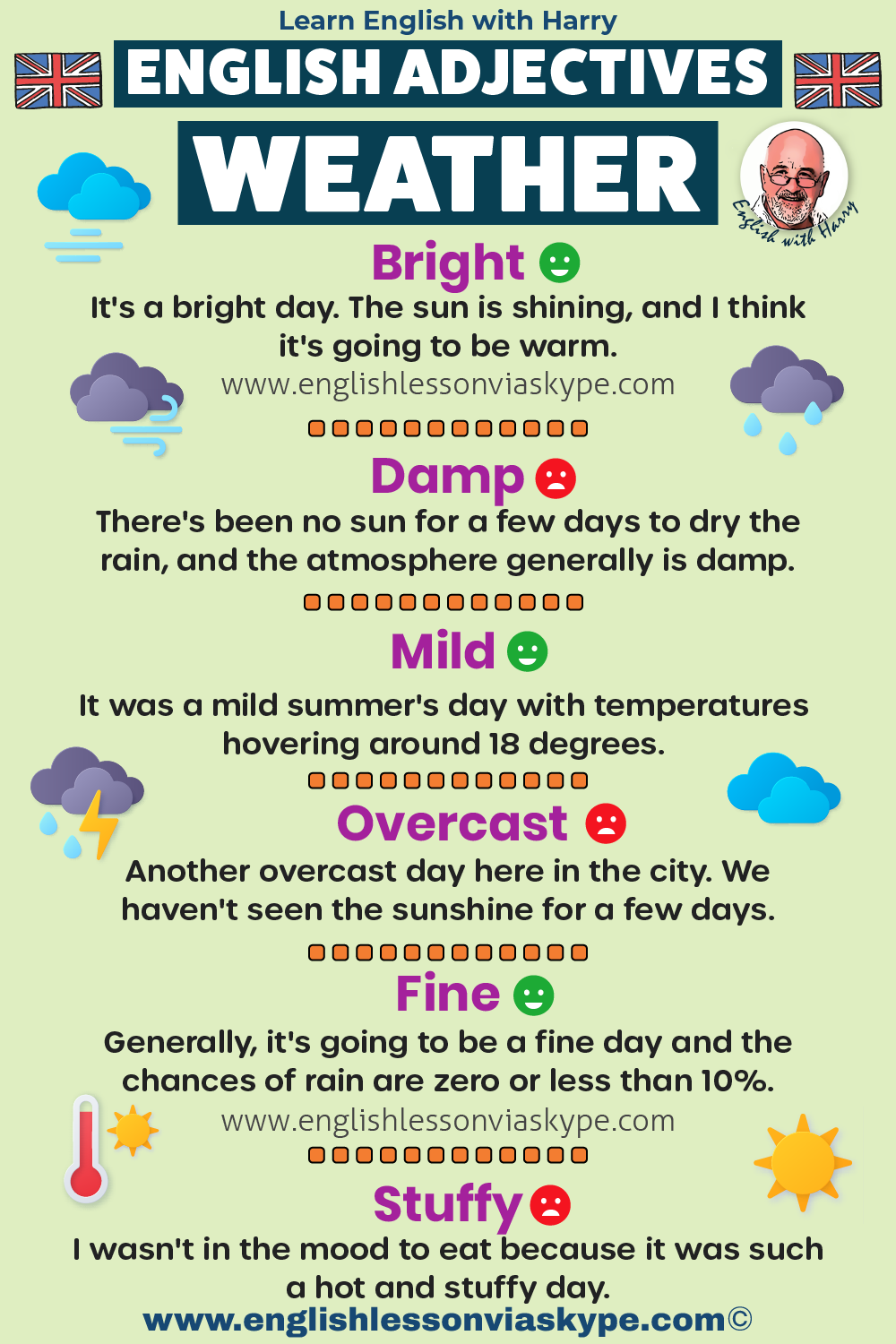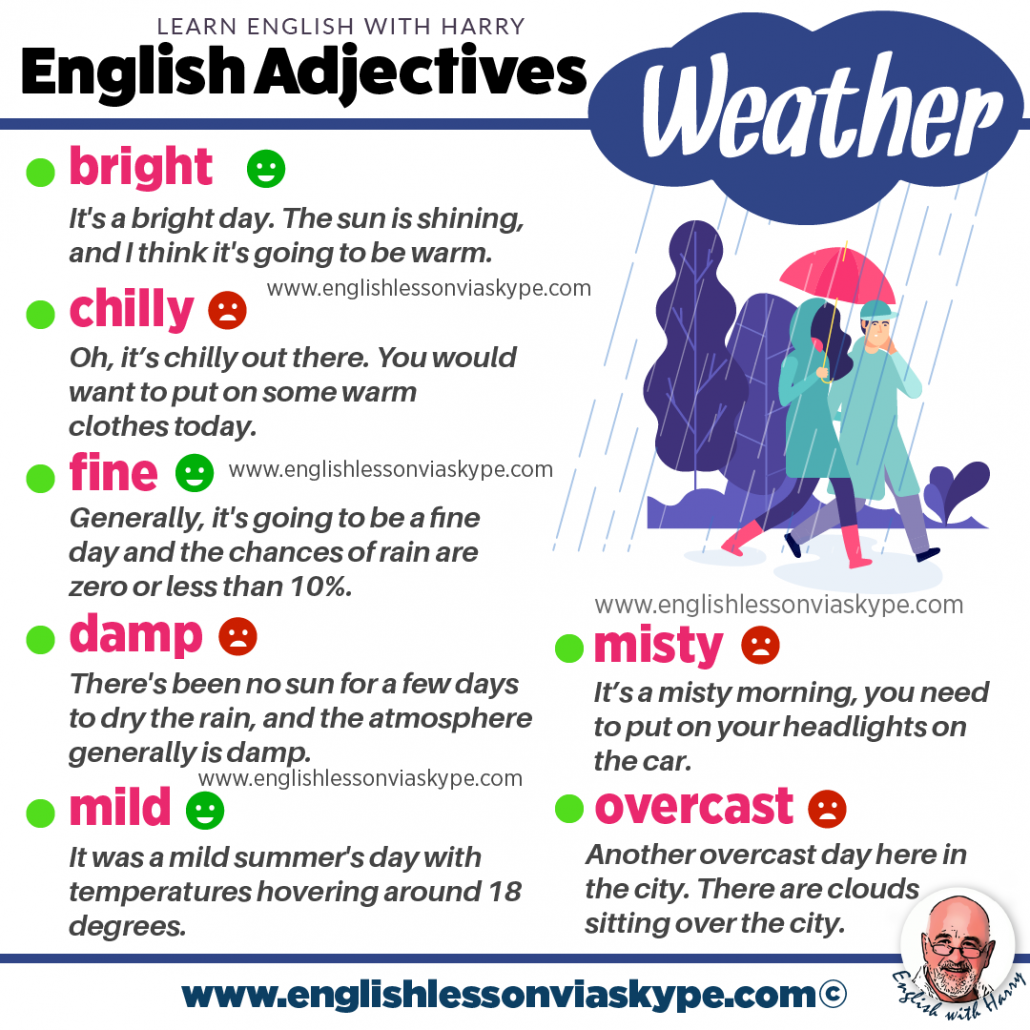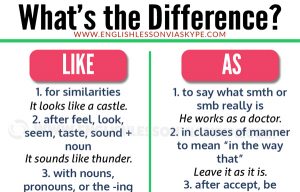Learn advanced adjectives for describing the weather in English. These are English adjectives that you might not normally use or you might not have thought are associated with describing weather conditions. Positive and negative adjectives for describing the weather.
Listen to the podcast Speak Better English with Harry or watch it on YouTube at Learn English with Harry.
Speak Better English with Harry - Episode 323
English Weather Adjectives
Harry
advanced adjectives for describing the weather

Hi guys, this is Harry and welcome back to my podcast where I try to help you to get a better understanding of the English language.
Learn how to use phrasal verbs, expressions, idiomatic phrases. How to include and improve your vocabulary, pronunciation, all aspects of English. So you can communicate better with your friends, your colleagues, your family, and when you go eventually back onto overseas or international trips.
So what are we going to talk about today? Well, we’re going to talk about the weather.
It’s probably the most popular, small talk topic that you could pick. Everybody likes to talk about the weather, particularly in Europe and parts of Europe, like the UK, and Ireland, where I’m living currently. Here the weather usually is not so good.
improve english on a budget
Online English Courses from €7.99
It seems we can't find what you're looking for.
So we’re here talking about advanced English adjectives describing the weather.
We’re going to look at the positive (sometimes there are some positive aspects about the weather) and negative. And as always, if you know anybody who would like to benefit from these particular podcasts, we’ll give them the details. In the end, I’m going to give you my contact details. I’ll go through them one by one, and then we’ll try and give you a quick example.
advanced adjectives for describing the weather
When we’re talking about positive adjectives for describing the weather, we can use:
- bright
- fine
- mild
- scorching
And negative:
- chilly
- damp
- misty
- overcast
- stuffy
- unsettled
Of course, I haven’t included very obvious words that you can use like sunny, wet, or rainy.
book your trial English Lesson
Let’s take the positives first:
bright
Meaning: A bright day is when you wake up in the morning, and the sun is shining, the sky is blue, and there are only light clouds (if any). It’s not dark or depressing.
It’s a bright day. The sun is shining, and I think it’s going to be warm.
We can also use English collocations:
- bright future
- bright light
fine
Meaning: we use it to describe the weather with some sunshine, high clouds, a light breeze and low chances of rain
Fine is one of those words that you can use to describe lots of things.
-How are you today?
-I’m fine.
Meaning I’m okay.
-How’s work?
-Work is fine.
Meaning there are no problems.
Example:
Generally, it’s going to be a fine day and the chances of rain are zero or less than 10%.
We can use it to emphasise a particular day.
A fine sunny day.
If you want to say it’s a fine sunny day, so you give a bit of emphasis to the word ‘sunny’.
Or a fine summer’s day.
It’s what you’d expect to have in summer.
advanced adjectives for describing the weather

Share and help other students to improve English language skills.
Next is
mild
Meaning: when we have mild weather, it usually means that it’s not hot, but it’s not cold. You probably might need a very light shirt or even a light jacket from time to time. But you don’t need anything else because the weather is mild.
The winds might be mild, it’s not blowing a gale force, but it’s not in a situation where there’s no wind at all. And again, probably little chance of any rain.
Example:
It was a mild summer’s day with temperatures hovering around 18 degrees.
And then we have
scorching
Meaning: really really hot, even as you’re almost on fire
Example:
It’s going to be scorching today. It’s going to be touching 30 degrees. Don’t forget to put on that sunblock and protect yourselves.
Now let’s cover the negative
chilly
Meaning: it’s a little bit cold out there. It’s not yet the middle of the winter so you’re not expecting to put on the heavy coat or the hat and the gloves but while when you open the door to get the post or let the dog out then you could feel this wind blowing.
Example:
Oh, it’s chilly out there. You would want to put on some warm clothes today. There’s a chilly breeze or a chilly wind blowing.
You know that you’re heading into the winter because the temperature has dipped.
advanced adjectives for describing the weather
Next
damp
Meaning: a day when it has been raining for some considerable period of time; the ground is wet, the grass is wet, the windows still have the remains of the last rain shower
Example:
There’s been no sun for a few days to dry the rain, and the atmosphere generally is damp.
Next, we have
misty
Meaning: a day when there are low clouds sitting over your city/town; the rain has been falling; you can see but not very well
Example:
It’s a misty morning, you need to put on your headlights on the car so that you can see other cars and they can see you.
You need to have perhaps an umbrella because there is a bit of dampness or moisture in the air. If there’s no wind, that mist could hang around for quite a while a few hours or even the whole day.
advanced adjectives for describing the weather
overcast
Meaning: there are a lot of dark low clouds in the sky
Example:
Another overcast day here in the city. There are clouds sitting over the city. We haven’t seen the sunshine for a few days.
stuffy
Meaning: the atmosphere is quite heavy, the temperature is high; there’s no wind, it’s hard to breathe
Example:
I wasn’t in the mood to eat because it was such a hot and stuffy day.
And then finally,
unsettled
Meaning: the weather conditions are changing quite frequently; it’s some rain, some wind, a little bit cold, then it may stop for an hour or so
Example:
I think if you’re going to town today, you’d either bring a raincoat or an umbrella because the weather is quite unsettled and not quite sure what it’s going to do. It might rain, it might snow, the wind might blow.
So these English adjectives are just different adjectives than you might normally use.
You can use them in conjunction with other adjectives that we often use connected with the weather.
So if you need any other words connected with that, you can check out my webpage and you’ll find them. Don’t forget to tell your friends how to use these advanced adjectives for describing the weather in English.
As always, if you want to contact me, you can do so at www.englishlessonviaskype.com. I’m always happy to hear from you.
As always, thanks for listening and join me again soon.
improve english on a budget
Online English Courses from €7.99
It seems we can't find what you're looking for.
More information
For more information on English grammar rules, English collocations and English idioms, check out the links below:
Difference between Seem, Look and Appear
You can always study English advanced level at Learning English with the BBC.
You will love these English lessons

Talking about Health in English – Visit to the Doctor Vocabulary
Useful vocabulary for talking about health in English. You don’t feel well. Being sick is never fun, it’s definitely not


Difference between Like and As
Difference between Like and As is one of the common mistakes made by ESL students. So if you’re planning to


20 English Verbs To Describe Eating And Drinking
Learn 20 English verbs to describe eating and drinking. Intermediate and advanced words that are used by natives on a